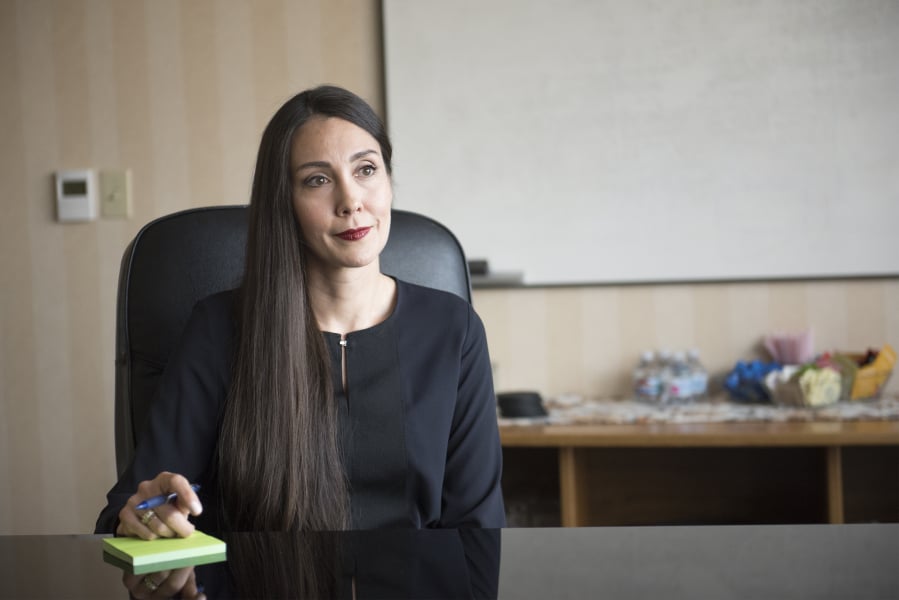The Columbia River Economic Development Council kicked off the new year by welcoming three members to its board of directors, along with the economic development organization’s new president, Jennifer Baker.
Baker most recently served as the deputy district director for the Portland office of the U.S. Small Business Administration, and previously worked in multiple business and trade fields, including four years as an international trade specialist with the U.S. Department of Commerce.
“I couldn’t be more excited to be handing the reins over to Jennifer,” said Max Ault, who served as interim president in 2018. “2018 was a really busy year for us, and that momentum continues into 2019.”
Baker began her tenure Jan. 14, and the new board members were officially voted in at the council’s annual investor event at the ilani casino on Wednesday. Alan Hwang of ACH Marketing, Andy Lowery of RealWear, Kara Fox-LaRose of ilani and Tim Price of Yaculta were elected to three-year terms on the board.
The council’s board officers are: chair (2018-2019): Casey Wyckoff, LSW Architects; vice chair (2018-2019): Lisa Lowe, Schwabe Williamson & Wyatt; immediate past chair (2018-2019): Greg Seifert, Biggs Insurance Services; treasurer (2019): Lisa Dow, Columbia Bank; secretary (2019): Helen Devery, BergerABAM.
The event included a recap of the council’s progress on the Clark County Comprehensive Economic Development Plan, a five-year strategic plan that the organization adopted in 2017, which focuses on three core goals: expand the existing business base, support people and create place.
In her closing remarks to CREDC investors, Baker said that 2019 would be a year of increased direct action, and she urged the members to reach out to her and share their stories, as well as reaching out to others in their networks and focus on asking the questions that will spur action.
Earlier in the day, The Columbian sat down for an interview with Baker at the council’s downtown Vancouver office to learn more about her plans for the CREDC. Answers have been edited for length and clarity.
Coming from the U.S. Small Business Administration, what was appealing about the CREDC and Clark County? What kind of opportunities did you see there?
I fully subscribe to the vision of the Clark County Comprehensive Economic Development Plan, and that vision is to recognize Clark County as the most inclusive, healthy an amenity-rich community in the U.S.
Those values and the commitment and investment that I see from community members is palpable in the meetings I attended when I was an SBA employee, and certainly now that I’m president of the CREDC. Being a part of a community that’s so invested allows us to do great things.
How much interaction did you have with the CREDC prior to seeking out this role?
The CREDC was part of a consortium of partners who were administering a Jobs and Innovation Accelerator Challenge grant several years back, and so I worked with Elizabeth (Scott), who is now our business development director, on the implementation of that grant.
What appealed to you about this position, and how will your background contribute to your job performance?
I would say that I’m resourceful and diplomatic, and I feel like I have a knack for asking the right kinds of questions to help bring awareness and drive decision making. The experience of having worked with big businesses on international trade issues and businesses as small as a food cart — that expanse of experiences is what I’ll draw on to be particularly creative and resourceful as I liaise with the board and the investor community in realizing the next steps for the economic development plan.
One of the things in particular that fuels me is when I can drive by a warehouse or a business that was able to grow by virtue of the help that’s been infused by an organization — in this case, CREDC — and know that there are people employed by virtue of the efforts of the community. That’s very gratifying, to be able to see the results in our community and to know that employment opportunities are being created.
Do you see this transition as a continuation of your more recent work with small businesses, or more of a transition back towards the kind of trade and commerce work you did prior to the Small Business Administration, or both?
I hope it’ll be both. Well, I know it will be both. Depending on the industry, the SBA defines a small business as anything with 500 employees or fewer. So ‘small’ tends to still be pretty large in the lens of the SBA. I’m not anticipating a huge vacillation, and harkening back to my commerce days, I certainly worked with some very large corporations, helping them with trade policy.
Clark County is doing well economically, but like the rest of the Portland region, there have been struggles with housing affordability and struggles for businesses to attract skilled labor. What can the CREDC do to help address these issues, and what are some of the other issues facing the county that you want to be able to play a hand in tackling?
Stemming from the CREDC vision, we’ve outlined three business goals. (The first is to) expand the existing business space, and that entails building out traded sector. (The second is) supporting people, so making sure that the Clark County workforce is gaining skills and capacity to be a collaborative partner with industry, and/or attracting workforce from outside of Clark County to bolster workforce where there happen to be specific needs.
The third prong of the plan is creating place, and we keep an eye on the lands available for development and coordinate with our city and county partners on that inventory. But another part of creating place is the quality of life factor; being able to reach out and share that Clark county has amazing natural amenities.
Whether that’s kayaking up in Ridgefield or taking a hike on trails around La Center, or taking a stroll around the Vancouver Waterfront, or walking through Main Street in Camas, or the old historic district in Battle Ground, there are so many amazing amenities that we can share about the quality of life here, and I think that will continue to attract top talent.
Clark County has a growing technology sector. What is it going to take to keep it growing and make the county competitive in the tech field?
That relates directly to the second two goals of the strategic plan, which are support people — helping to build a workforce that is capable of meeting the needs of the tech industry as they look to move to town — and creating place.
Tech industry salaries tend to be higher-end salaries, averaging around $102,000 annually, and oftentimes employees in tech firms want to move somewhere where they can work hard and play hard, and here you have a fusion of both.
The diversity of towns that are relatively proximal means that you can have employees who live in different towns depending on whether or not they really subscribe to an urban experience or if they want to have a wooded lot somewhere.
As you said, there are different cities here that are very diverse and the county overall has a lot of variation to it — so how do you balance the competing business interests? How do you find solutions that are going to fit with everybody in Clark County?
I think that really correlates back to the cities and their uniqueness. Each city has something distinct to offer that makes Clark County desirable and accessible and inviting. So I think in some ways it’s up to those who are exploring Clark County to see what really fits with their life philosophy, because I think we really offer a little bit of it all.
The CREDC has been very public about wanting to move forward on replacing the Interstate 5 Bridge. What role do you see the CREDC playing in trying to pick those discussions back up, and how can we avoid another stalemate?
CREDC has set up an I-5 corridor task force and we’re inviting city representatives, Port (of Vancouver) representatives and regional transportation representatives to the table. (A new bridge) really will help connect Clark County to the rest of the West Coast more fluidly, and Clark County internationally. We’re pleased that Gov. Jay Inslee proposed a $17.5 million budget line item for an I-5 project office.
Coalescing the voices of the business industry and emphasizing the importance of transportation infrastructure to traded sector will help inform the dialogs to come. I think we have a huge commitment on behalf of interested parties to help share our story and help share the benefits of an optimized I-5 project.
Are there any other large-scale projects that the business community or the CREDC see Clark County as needing right now?
Investment in people is one of the key investments. I know I’m transitioning from infrastructure to workforce, but one of the common themes we hear from business owners in Clark County is that they’re really having to be effortful to find the right workforce contributors to grow their businesses, so I think continued investment in skilled labor and STEM — those will all be important ingredients to building out the most competitive economy.
Is there anything else you’d like to say about the job, or to introduce yourself to residents and business owners in Clark County?
The community has been very welcoming so far, and I’m so excited to be out and about and hearing people’s stories; their experiences building a business or resourcing business components or trying to explore new markets and troubleshoot parts of the supply chain. I think hearing those stories and being able to translate them into opportunity for other businesses and for businesses outside of the community will be really valuable.




